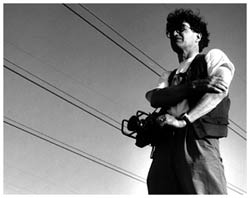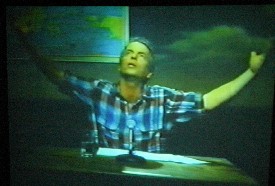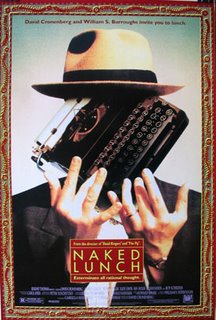 This book review of the anthology The American Movie Critics is inspiring me to take another look at that perennial issue of democracy in film criticism.
This book review of the anthology The American Movie Critics is inspiring me to take another look at that perennial issue of democracy in film criticism.I basically distrust the idea of the film expert simply because so few of them are really experts. There are really three kinds of film buffs: the classic film buffs who are well-aquainted with Hollywood studio films from the pre-MPAA era; the cult film buffs who are junkies for sensation, the Quentin Tarantinos and Psychotronic Movie Guide crowd, if you will, they're well-aquainted with anything "exploitation"; and then there are the art film buffs, who tend to be the most arrogant of the bunch-- the self-proclaimed experts of films. The problem with these guys is that they only watch the "cream" of the exploitation and classic genres. The only way you can get them to watch the "dregs" is if the dregs are playing in theaters across the country and are topical. Because they don't watch the shitty classics and the shitty exploitation films, they're unfamiliar with the genre conventions and can often have a grossly slanted view of something like, say, film noir.
If you think yourself a film expert you sure as fuck better be able to converse fluently about hardcore porn from the early eighties. To say nothing of the Friday the 13th decalog. I'd also love to hear your opinion on the nine films that James Cagney made between The Public Enemy and Footlight Parade.
It's not just breadth and depth of knowledge about film. I always go back on that rant that these arbitrators of film culture are not experts on psychology, sociology, theology, anthropology, geography, history, or philosophy. Many are well-read, few if any well-read enough to justify their position in deciding what's art and what's not. Are there gradients? I would assume, but as there could hardly ever be anybody who is qualified to be an arbitrator of film culture, that line that somebody must cross in order to determine what's great art will be pretty much perpetually undefined.
So basically, Joe Blow's opinion really is as good as yours and mine. Find something you like, find something you hate; figure out what you like and what you hate and why. Any asshole with a keyboard can be a film critic, all you need is an opinion that you're going to stand by. I've found myself searching on the IMDB for people who love (or even just like) Man of the House, Firewall, and Dukes of Hazzard and see if they hate anything "good". I did find one Firewall fan who also really liked Aeon Flux, Uptown Girls, Resident Evil: Apocalypse and The Skeleton Key and disliked King Kong. (He also disliked 2046, but then again so did I). Granted for every film that this guy dislikes there're ten that he likes. That seems to be the dominant trend among the "bad" movie fans and disqualifies them from being regarded as valid film critics. Not because they're not sophisticated enough to like King Kong, but just because they don't have real opinions. But still, if you think that The Skeleton Key is a good movie and King Kong isn't you might be seeing something that the rest of us aren't and I'm eager to find out what it is. The Skeleton Key fans usually disappoint me, but you know I can't take the elitist position because, basically, there for the grace of God go I.
Update: Walt's pan of Basic Instinct 2 is up and loaded. Bad news, it's not so bad it's funny.
If you haven't already, make it a point to check out Walter's kick-ass piece on Showtime's Huff and Masters of Horror, my characteristically button-pushing review of Bill Hicks: Sane Man, and Bill's DVD update of the universally-reviled (except by that guy who hated King Kong which doesn't help my case any) Elizabethtown.
Update: We also have a fresh review of Wim Wender's latest: Don't Come Knocking.



 Will be doing a “one-shot” film and discussion in Gilpin County of David Cronenberg’s
Will be doing a “one-shot” film and discussion in Gilpin County of David Cronenberg’s 

 Look for reviews of the first season of “Grey’s Anatomy” and the second season of “Arrested Development” sooner than later (so long as all these drugs hold out) – the hell of writing on “Grey’s Anatomy” isn’t that it’s a tough nut to crack, but that there are so many extras on there that getting through all of it is a little like touching my tongue to a weasel carcass. I do like to refer to the show now as “Puked a Little in My Mouth: Season One”. My wife wondered why – until she watched one-and-two-thirds episodes.
Look for reviews of the first season of “Grey’s Anatomy” and the second season of “Arrested Development” sooner than later (so long as all these drugs hold out) – the hell of writing on “Grey’s Anatomy” isn’t that it’s a tough nut to crack, but that there are so many extras on there that getting through all of it is a little like touching my tongue to a weasel carcass. I do like to refer to the show now as “Puked a Little in My Mouth: Season One”. My wife wondered why – until she watched one-and-two-thirds episodes.


 I did get to see, in a private screening, V for Vendetta which is, no kidding, the ballsiest excoriation of Bush Jrs’ administration that I’ve ever seen (and entertaining, too) – also Lucky Number Slevin and a very cool documentary on musician Daniel Johnston. A good week: with the exception of
I did get to see, in a private screening, V for Vendetta which is, no kidding, the ballsiest excoriation of Bush Jrs’ administration that I’ve ever seen (and entertaining, too) – also Lucky Number Slevin and a very cool documentary on musician Daniel Johnston. A good week: with the exception of 





